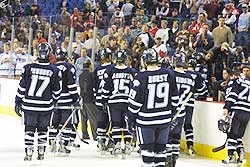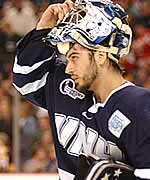A new season opens. Bitter losses are forgotten. Hope springs eternal.
So it was last October when New Hampshire resumed the quest for its first national championship. Cynics might have disagreed, but this was going to be New Hampshire’s year. They returned their top goaltender, their entire defense and virtually all of their offense except for Darren Haydar. Admittedly, that was a big-time hole, but replacements looked ready to fill his void.
This was the year.

The bitter loss of the 2002 NCAA semifinal game would be forgotten. UNH had sleepwalked through that one, losing to Maine, 7-2. That experience would be a steppingstone to better things this year. It would combine with the Wildcats’ first-ever Hockey East tournament championship to make the team more battle-tested in the postseason. Take lemons and make lemonade.
This was the year.
The mantra worked all the way until the national championship game. UNH came from behind to share the regular season Hockey East crown with Boston College and then won the league tournament. The Wildcats then emerged victorious from the Northeast Regional to appear in their fourth Frozen Four in the last six years.
This was the year.
UNH exorcised the demons from the previous year’s semifinal performance, toppling top-seeded Cornell, 3-2. New Hampshire would face Minnesota in the title game. If at times it appeared that someone had put the whammy on the Wildcats, this was nothing compared to the hex on defending national champions. Not one had repeated since Boston University in 1971 and 1972, the longest such streak in NCAA sports.
This was the year.
The first period opened in rocky fashion with Minnesota taking a 1-0 lead and eventually finishing with a 16-7 shot advantage. But a tic-tac-toe goal — Justin Aikins to Nathan Martz to Sean Collins to the back of the net — in the closing minute evened the score heading into intermission.
The Wildcats were tied despite getting outplayed for much of the period. They’d gotten the huge momentum-turner in the fabled final minute, when the importance of any goal is magnified.
What’s more, a UNH fan had somehow slipped a fish through security and it flew through the air and onto the ice following Collins’ goal.
This was the year.

During intermission the Jumbotron began to play a classic game clip. During the semifinals, the clips had been chosen to appeal to the fans of one of the two teams playing. In this case, however, the 1999 championship game overtime between UNH and Maine began. This appalling choice had the effect of rubbing the faces of Wildcat fans in their most bitter defeat of all time, the closest of all close-but-no-cigar contests. As omens go, this was as bad as it could get.
Maybe this wasn’t the year.
No, hold that thought. The offending clip suddenly went to black and never reappeared. The brain cramp of a selection had been excised.
This was the year after all.
Minnesota outshot New Hampshire again in the second period, but this time only by a 14-9 margin. The score remained tied, 1-1, thanks to Barry Tallackson’s shorthanded breakaway bid with 5.6 seconds remaining clanging iron.
The two-period total of 30-16 was cause for alarm, but the Wildcats were rope-a-doping them. That was it. This was the year, rope-a-dope was the tactic and the game would be decided by UNH’s superior goaltending. Believe it.
This was the year.
Then came the third period. In little more than a five-minute span, Minnesota blew the game open with three goals. An empty-netter would result in the final 5-1 margin.
This wasn’t the year.
“In the 1999 championship game I thought we outplayed Maine, but lost on the bounce of a puck,” said UNH coach Dick Umile. “Tonight, I think the better team won. We tried to hang in there, but they did a good job and you’ve got to give them credit.”
Even so, it had a Red Soxian feel to it.
Not like the 1967 World Series since UNH had never been a 100-to-1 shot and there was no one star a la Carl Yastrzemski who carried the team.
It wasn’t like the 1975 World Series with its Bernie Carbo three-run home run to tie it up and set the stage for Carlton Fisk’s hand-waving game-ender. At no point in New Hampshire’s NCAA run had it trailed until the title game.
It wasn’t like the 1978 one-game playoff with the Yankees and Bucky Dent’s home run. Minnesota’s huge goal and eventual game-winner had come on a highlight film move by Thomas Vanek, the WCHA Rookie of the Year and leading Gophers scorer. No Bucky Dent he.
It wasn’t like the 1986 World Series when the game was within the Red Sox’ grasp only to end in Bill Buckner and crushing defeat. There was no Buckner on the UNH bench. No scapegoat.
Nonetheless, the hearts of UNH Nation, much like those of Red Sox Nation, had been broken. They might not have been waiting since 1918, but it still was time for the phrase that every team but Minnesota now employs.
Wait till next year.
Although that might work on some level for fans, it doesn’t for the six UNH seniors who have dressed for their last game.
“I can’t really believe it,” said Colin Hemingway, the one senior in the locker room who appeared best able to speak through the sadness. “It’s my senior year. I’m done. I’m not ever going to play a collegiate game again. I can’t really believe it’s over. It really hurts right now.”
Red Soxian indeed.
Nonetheless, the future remains bright. Great talent returns and more great talent is on the way. The Wildcats will be back.
“This experience only helps the program,” said Umile.
And so it’s fast forward to next October.
A new season will open. This bitter loss will be forgotten. Hope will spring eternal.


